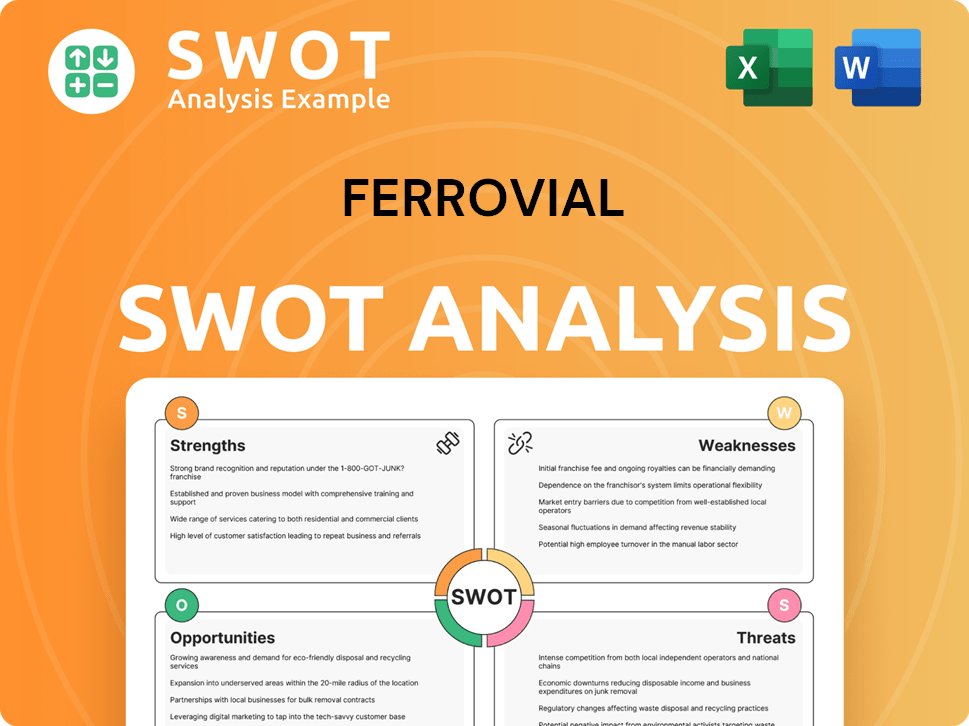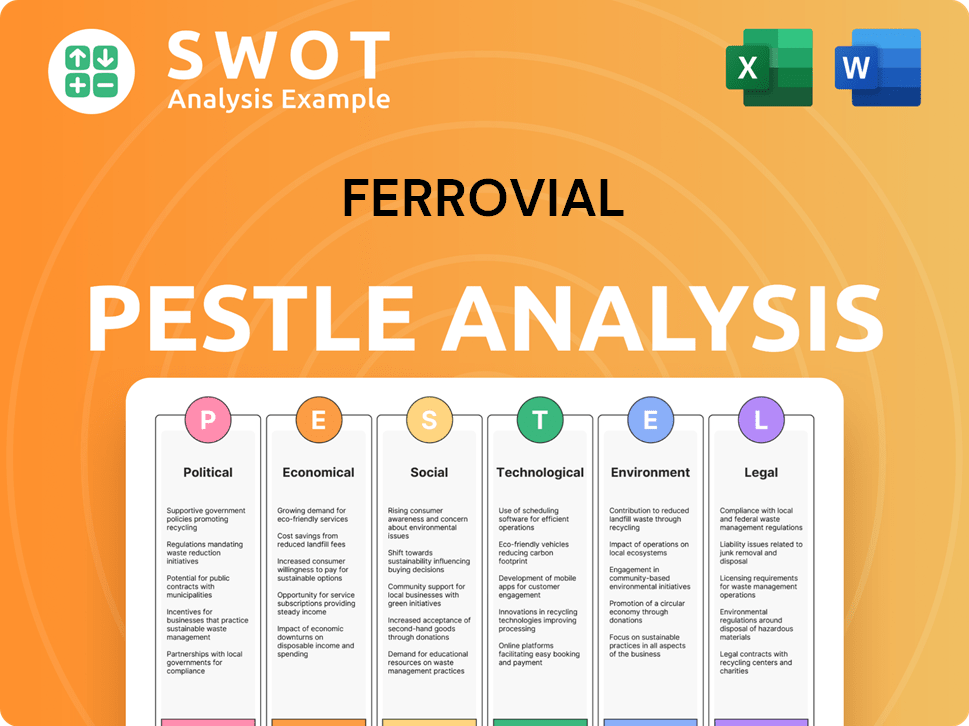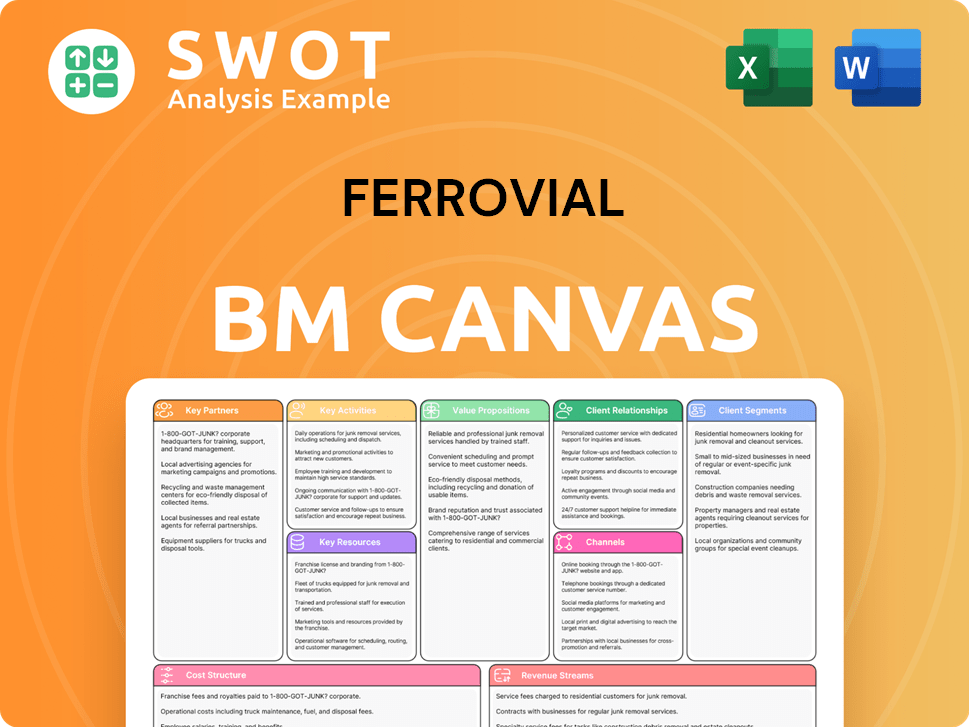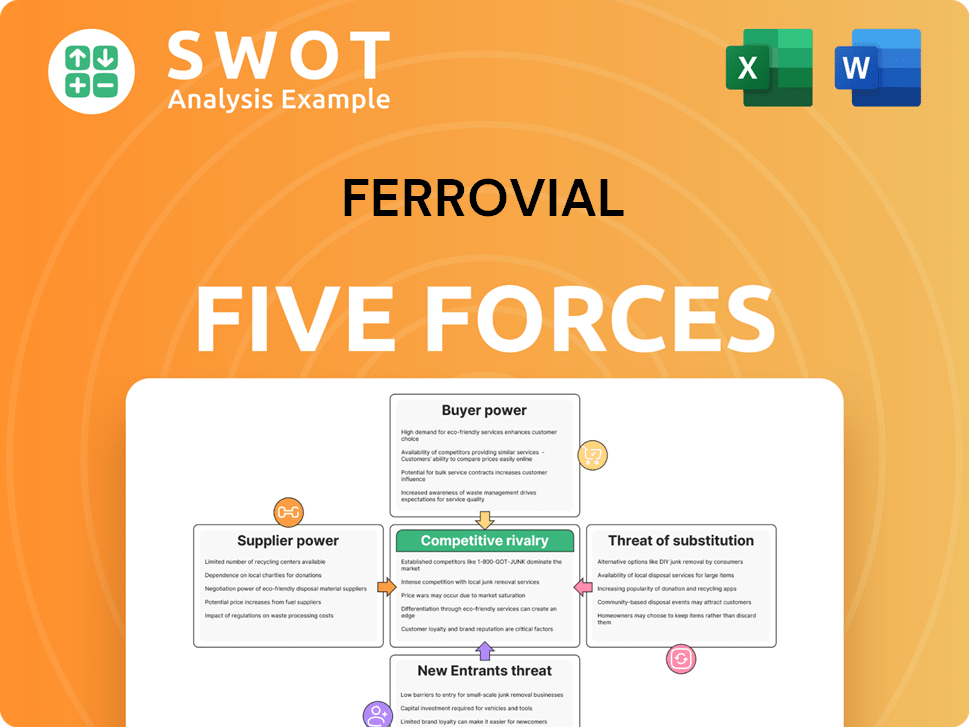Ferrovial Bundle
What Drives Ferrovial's Success?
Understanding a company's core principles is crucial for any investor or strategist. Ferrovial, a global leader in infrastructure, operates with a defined set of guiding principles that shape its business decisions and impact its market performance. Delving into Ferrovial's mission, vision, and core values offers invaluable insights into its strategic direction.

This exploration of Ferrovial's foundational elements – its mission, vision, and core values – is essential for grasping its long-term strategy. These elements, including Ferrovial SWOT Analysis, are not just corporate buzzwords; they are the very essence of how Ferrovial, a leading infrastructure operator, approaches its business. Discover how these principles drive innovation, sustainability, and ultimately, value creation within the Ferrovial company.
Key Takeaways
- Ferrovial's mission, vision, and values drive its strategic direction and operational success.
- Strong financial performance, including 2024 and Q1 2025 growth, reflects its commitment to sustainability.
- Focus on innovation, North America, and asset rotation highlights a forward-looking strategy.
- Integration of AI and Digital Twins positions Ferrovial for future infrastructure advancements.
- Ferrovial's purpose shapes the future through essential, sustainable infrastructure.
Mission: What is Ferrovial Mission Statement?
Ferrovial's mission is 'Ferrovial, as a leading developer and operator in the infrastructure and services sector, will continue to shape the future of society with a continuous focus on delivering sustainable solutions.'
Understanding the Ferrovial mission statement is crucial for grasping the company's direction and its impact on the global landscape. This mission statement serves as the cornerstone of Ferrovial's strategy, guiding its operations and investment decisions. It clearly outlines the company's commitment to sustainable development and its role in improving communities worldwide.
The primary target customers for Ferrovial are societies and communities globally. Ferrovial offers a wide array of infrastructure solutions, including transportation, building, water, and energy infrastructure. These services are designed to meet the evolving needs of communities.
Ferrovial operates on a global scale, with significant presence in the United States, Canada, the United Kingdom, Spain, Poland, Chile, Colombia, and Peru. This wide geographical footprint allows Ferrovial to impact diverse communities and contribute to their development.
Ferrovial distinguishes itself through its commitment to sustainable and innovative infrastructure solutions. This focus on sustainability and innovation allows Ferrovial to improve communities and connect people effectively. This is a key element of Ferrovial's principles.
In April 2024, Ferrovial, as part of a consortium, was selected to develop the Lima Peripheral Ring Road in Peru, valued at approximately USD 3.4 billion. This project exemplifies Ferrovial's commitment to improving connectivity and shaping the future of society. Ferrovial's mission is clearly customer-centric.
Ferrovial's investment in renewable energy projects, like the acquisition of two photovoltaic plants in Texas (257 MWdc) and Poland (60 MWdc) in 2024, demonstrates its focus on delivering sustainable solutions. This expansion into the energy sector showcases its commitment to environmental responsibility.
Ferrovial's sustained inclusion in the Dow Jones Sustainability Index World for 23 consecutive years, achieving a top ranking in the construction and engineering sector, underscores its dedication to sustainable practices. This long-term commitment is a testament to Ferrovial's core values.
The Ferrovial company continues to integrate innovation into its projects, utilizing technologies like Digital Twins, AI, and XR Reality. This approach ensures that Ferrovial remains at the forefront of the infrastructure and services sector. For a deeper dive into how Ferrovial approaches its market, consider exploring the Marketing Strategy of Ferrovial.
Ferrovial SWOT Analysis
- Complete SWOT Breakdown
- Fully Customizable
- Editable in Excel & Word
- Professional Formatting
- Investor-Ready Format

Vision: What is Ferrovial Vision Statement?
Ferrovial's vision is to be a global leader in sustainable infrastructure, driving innovation and efficiency to create lasting value for stakeholders and communities worldwide.
Let's delve into the ambitious vision of Ferrovial, a company deeply committed to shaping the future of infrastructure. Understanding the Ferrovial vision is crucial for grasping its strategic direction and long-term goals.
Ferrovial's vision is inherently forward-looking, emphasizing excellence in developing and managing sustainable infrastructure. This commitment extends to innovation, efficiency, and strategic market selection, ensuring long-term viability and positive impact.
The company aspires to achieve a significant global impact, aiming for market leadership, particularly in the United States, a key growth market. This strategic focus underscores Ferrovial's ambition to become a dominant player in the infrastructure sector.
New airport investments are anticipated to be a primary driver of future growth, alongside the continued development of managed lanes and toll roads. These areas represent significant opportunities for Ferrovial to expand its portfolio and enhance its market position.
The realism of Ferrovial's vision is supported by its current performance and market position. The company's robust financial results and significant construction backlog demonstrate its ability to execute its strategic plan effectively.
In Q1 2025, Ferrovial reported a 7.4% revenue growth to €2.1 billion and a 19.1% increase in adjusted EBITDA, indicating strong performance across its business divisions. BofA Securities upgraded Ferrovial's stock to 'Buy' in December 2024, citing a positive outlook for its U.S. managed lanes, which are expected to drive over 15% EBITDA growth by 2025.
The company's construction backlog reached an all-time high of €17.2 billion in Q1 2025, with 45% in North America, signaling strong future project execution. This substantial backlog provides a solid foundation for realizing its vision.
The Ferrovial vision is not just a statement; it's a roadmap for the future. It's about building a sustainable infrastructure that benefits society and generates long-term value for its stakeholders. This commitment to sustainability and innovation is a core element of the company's strategy. To understand the roots of this vision, it's helpful to look at the company's history. This vision is further reinforced by the Ferrovial core values, which guide the company's actions and decisions.
Ferrovial PESTLE Analysis
- Covers All 6 PESTLE Categories
- No Research Needed – Save Hours of Work
- Built by Experts, Trusted by Consultants
- Instant Download, Ready to Use
- 100% Editable, Fully Customizable

Values: What is Ferrovial Core Values Statement?
Understanding the core values of Ferrovial provides crucial insights into its operational philosophy and strategic direction. While not explicitly listed in a concise format, these principles are deeply embedded in the company's actions and public commitments, shaping its corporate culture and guiding its decision-making processes.
Ferrovial places a high value on its people, prioritizing health, safety, and employee development. This commitment is evident in its use of innovative technologies to prevent accidents and its focus on attracting and retaining top talent. Continuous training, awareness campaigns, and management involvement in safety protocols are key aspects of this value, ensuring a safe and engaged workforce.
Innovation is a cornerstone of Ferrovial's operations, driving its adoption of new technologies and forward-thinking solutions. The company actively explores various use cases for technologies like Digital Twins and AI across its business areas. This value translates into smart infrastructure solutions and the adoption of advanced construction techniques, such as the establishment of a new Digital Infrastructure Division in 2024, targeting the high-growth data center market.
Ferrovial demonstrates a strong commitment to sustainability, reflected in its 23rd consecutive year of inclusion in the Dow Jones Sustainability Index World, achieving a top ranking in the construction and engineering sector in 2024. This value is apparent in its focus on green projects, ambitious emission reduction targets (40% reduction in Scope 1 and 2 emissions by 2030 and net-zero emissions by 2040), and waste management initiatives, with over 70% recycling rates in some operations.
Ferrovial prioritizes value creation and profitability, as demonstrated by its strategic plan, Plan Horizon 24, which targets an 11% annual EBITDA growth. This value is reflected in selective bidding, a focus on long-term profitability, and the delivery of high-quality infrastructure. The company's robust financial performance in 2024, with an adjusted EBITDA of €1.3 billion and revenue of €9.1 billion, underscores its commitment to this core value.
These core values, which are integral to the Ferrovial mission, differentiate the company by emphasizing a holistic approach to infrastructure development. They foster a unique corporate identity centered on responsible, innovative, and sustainable infrastructure solutions, as explored further in our analysis of the Growth Strategy of Ferrovial. Next, we will delve into how Ferrovial's mission and vision influence the company's strategic decisions.
How Mission & Vision Influence Ferrovial Business?
Ferrovial's mission, vision, and core values are not merely aspirational statements; they are the guiding principles that shape its strategic decisions and drive its operational activities. This influence is particularly evident in how Ferrovial pursues growth, manages its assets, and commits to sustainability and innovation.
Ferrovial's strategic decisions are deeply rooted in its mission and vision, creating a cohesive framework for its operations. This alignment is crucial for achieving its ambitious goals, including an 11% annual EBITDA growth over the next five years, as outlined in 'Plan Horizon 24'. This section will explore how Ferrovial's core values translate into tangible actions and measurable outcomes.
- Geographic Expansion and Market Focus: Ferrovial's strategic focus on North America, particularly the United States, is a direct reflection of its mission to shape the future by focusing on markets with high growth potential.
- Asset Rotation Strategy: The company's asset rotation strategy, divesting from mature assets and reinvesting in high-growth opportunities, aligns with its vision of seeking excellence through efficient business and market selection.
- Commitment to Sustainability and Innovation: Ferrovial's commitment to sustainability, including its 2024-2030 Sustainability Strategy, and its adoption of innovative technologies, directly reflects its mission to deliver sustainable solutions.
- Focus on Complex, High-Value Projects: Ferrovial's emphasis on complex greenfield projects is a direct reflection of its mission and vision, focusing on projects with high potential for value creation.
Ferrovial's strategic emphasis on North America, especially the United States, stems from its mission to shape the future of society by focusing on markets with high growth potential. This is evident in the significant revenue and adjusted EBITDA growth driven by North American assets, particularly US Highways, in Q1 2025. The company is actively pursuing new greenfield projects in states like Georgia, Virginia, North Carolina, and Tennessee, with six upcoming opportunities between 2025 and 2026.
The asset rotation strategy, a key component of Ferrovial's financial strategy, involves divesting from mature assets and reinvesting in high-growth opportunities. The sale of a 19.75% stake in Heathrow Airport for €2 billion in 2024 and the completion of the sale of its share in AGS airport in Q1 2025, followed by the acquisition of a 24% stake in IRB Infrastructure Trust in India, exemplifies this strategy. This approach is in line with the vision of seeking excellence through efficient business and market selection, ensuring long-term profitability.
Ferrovial's commitment to sustainability is a core tenet of its mission, reflected in its 2024-2030 Sustainability Strategy for its Airports division and its broader 2030 Sustainability Strategy, which targets carbon neutrality by 2050. The company's focus on green projects and the adoption of innovative technologies, such as Digital Twins, AI, and XR Reality, further underscore this commitment. The acquisition of photovoltaic plants in Texas and Poland in 2024 demonstrates its dedication to sustainable energy infrastructure.
Ferrovial's emphasis on complex, high-value greenfield projects is a direct reflection of its mission and vision, focusing on projects with high potential for value creation. The Lima Peripheral Ring Road in Peru and the ongoing construction of the New Terminal One (NTO) at JFK International Airport, which advanced by 6% in Q1 2025, exemplify this strategic focus. These projects highlight Ferrovial's commitment to delivering impactful infrastructure solutions.
The alignment of Ferrovial's mission and vision with its strategic decisions is evident in its financial performance and operational practices. The company's adjusted EBITDA growth of 38.9% in 2024, reaching €1.3 billion, and a robust revenue growth of 6.7% to €9.1 billion, are key indicators of its success. The construction division's adjusted EBIT margin reached 3.3% in Q1 2025, surpassing its long-term target. Ferrovial's inclusion in the Dow Jones Sustainability Index World for 23 consecutive years underscores its commitment to sustainability.
Ignacio Madridejos, Ferrovial CEO, emphasized the company's strategic direction in February 2025, stating, 'We see an attractive pipeline of assets in North America, where Ferrovial is well positioned to continue to develop complex, essential infrastructure projects that drive progress and improve the connectivity of a fast-moving world.' This statement underscores the company's commitment to its mission and vision.
In conclusion, Ferrovial's Ferrovial mission, vision, and core values are integral to its strategic decision-making processes, influencing its geographic focus, asset management, sustainability initiatives, and project selection. The company's commitment to these principles is demonstrated through its financial performance, operational practices, and long-term strategic objectives. To further understand how Ferrovial can improve its mission and vision, let's explore the next chapter: Core Improvements to Company's Mission and Vision.
Ferrovial Business Model Canvas
- Complete 9-Block Business Model Canvas
- Effortlessly Communicate Your Business Strategy
- Investor-Ready BMC Format
- 100% Editable and Customizable
- Clear and Structured Layout

What Are Mission & Vision Improvements?
While Ferrovial's current statements provide a solid foundation, strategic refinements can enhance their relevance and impact in a rapidly evolving landscape. These improvements aim to sharpen Ferrovial's focus, strengthen its market position, and better align with stakeholder expectations.
To enhance its Ferrovial mission and vision, the company should explicitly highlight its ambition to lead in digital infrastructure and smart solutions. This would involve integrating language about leveraging advanced technologies to create interconnected, intelligent, and resilient infrastructure networks, such as 'smart mobility ecosystems' or 'digitally-enabled infrastructure.' This is crucial, as the global smart cities market is projected to reach $2.5 trillion by 2028, offering significant growth opportunities for companies that prioritize digital transformation.
Given the increasing urgency of climate change, the Ferrovial vision should directly articulate a commitment to developing infrastructure that is not only sustainable but also highly resilient to climate impacts. This would resonate with growing investor and societal concerns regarding climate adaptation, positioning Ferrovial as a frontrunner in building infrastructure that withstands future environmental challenges, perhaps by explicitly mentioning 'climate-resilient infrastructure' or 'adaptive urban solutions.' The global market for climate resilience solutions is expected to reach $620 billion by 2027, underscoring the importance of this strategic focus.
The Ferrovial core values and mission statements could be strengthened by a more explicit and emotive articulation of the direct human benefit derived from Ferrovial's infrastructure. This would create a stronger emotional connection with stakeholders and highlight the societal value beyond economic growth, for instance, incorporating phrases like 'empowering communities through seamless connectivity' or 'enhancing quality of life through innovative infrastructure solutions.' This approach aligns with the increasing demand for companies to demonstrate their positive impact on society, which can improve brand reputation and attract investment.
To address emerging technologies and changing consumer behaviors, Ferrovial should adapt its mission and vision to reflect a stronger emphasis on circular economy principles within infrastructure development. Considering the entire lifecycle from material sourcing to end-of-life management, this would demonstrate a commitment to sustainability and resource efficiency. Furthermore, adapting the vision to explicitly address shifts in autonomous vehicles and new mobility solutions would demonstrate foresight, complementing the insights provided in Revenue Streams & Business Model of Ferrovial.
How Does Ferrovial Implement Corporate Strategy?
The true measure of any organization's mission, vision, and core values lies in their practical implementation. Ferrovial, a leading infrastructure operator, demonstrates this through concrete actions, strategic initiatives, and consistent communication across all levels of the company.
Ferrovial's commitment to its Ferrovial mission and Ferrovial vision is evident in its strategic projects and investments. These initiatives not only drive business growth but also reinforce the company's core values.
- New Terminal One (NTO) at JFK International Airport: This project exemplifies Ferrovial's dedication to developing essential transportation infrastructure and its focus on North America. Construction advanced by 6% in Q1 2025, with 18 airline agreements secured.
- Renewable Energy Investments: Ferrovial's foray into renewable energy, including the acquisition of photovoltaic plants in Texas (257 MWdc) and Poland (60 MWdc) in 2024, underscores its commitment to sustainability. The $72 million investment in the Texas plant, which will power 36,000 homes, is a prime example.
Leadership plays a critical role in reinforcing Ferrovial's strategic direction and ensuring alignment with its Ferrovial strategy. Ignacio Madridejos, the CEO, consistently communicates the company's goals, emphasizing growth and sustainability.
The 'Plan Horizon 24' is a formalized framework, approved by leadership, that sets strategic targets aligned with the mission and vision, including an 11% annual EBITDA growth target and a commitment to reducing CO2 emissions by 32% by 2030 compared to 2009 levels.
Ferrovial communicates its mission, vision, and Ferrovial core values to all stakeholders through various channels, ensuring transparency and accountability. This consistent communication builds trust and reinforces the company's commitment to responsible business practices.
Key communication channels include integrated annual reports (like the 2024 Integrated Annual Report), press releases, and investor presentations. Ferrovial's inclusion in leading sustainability indices, such as the Dow Jones Sustainability Index World for 23 consecutive years, further demonstrates its commitment.
Ferrovial's commitment to its core values is evident in its daily operations and business practices. These examples illustrate how the company translates its values into tangible actions.
Health and Safety: Ferrovial's 'risk aversion' approach to safety involves annual plans, continuous employee training, and management system audits. Innovation in Projects: The use of Microsoft's AI assistant Copilot by over 300 employees in 2024, saving an average of 90 minutes per week per employee, shows practical innovation. Community Impact: The Social Infrastructure program in Peru has invested over €1.3 million since 2011, improving access to clean drinking water and sanitation for over 29,000 people.
Ferrovial employs formal programs and systems to ensure alignment between its stated values and actual practices. These structures provide a framework for ethical conduct, sustainability, and good governance.
The Corporate Governance structure endorses good corporate governance in line with national and international best practices. The Ethics Channel provides a platform for reporting concerns. The 2030 Sustainability Strategy, structured around environment, community, and governance, drives alignment across the organization. For more information on the financial performance of Ferrovial, you can refer to this article about Owners & Shareholders of Ferrovial.
Ferrovial Porter's Five Forces Analysis
- Covers All 5 Competitive Forces in Detail
- Structured for Consultants, Students, and Founders
- 100% Editable in Microsoft Word & Excel
- Instant Digital Download – Use Immediately
- Compatible with Mac & PC – Fully Unlocked

Related Blogs
- What are Mission Vision & Core Values of Ferrovial Company?
- What is Competitive Landscape of Ferrovial Company?
- What is Growth Strategy and Future Prospects of Ferrovial Company?
- How Does Ferrovial Company Work?
- What is Sales and Marketing Strategy of Ferrovial Company?
- Who Owns Ferrovial Company?
- What is Customer Demographics and Target Market of Ferrovial Company?
Disclaimer
All information, articles, and product details provided on this website are for general informational and educational purposes only. We do not claim any ownership over, nor do we intend to infringe upon, any trademarks, copyrights, logos, brand names, or other intellectual property mentioned or depicted on this site. Such intellectual property remains the property of its respective owners, and any references here are made solely for identification or informational purposes, without implying any affiliation, endorsement, or partnership.
We make no representations or warranties, express or implied, regarding the accuracy, completeness, or suitability of any content or products presented. Nothing on this website should be construed as legal, tax, investment, financial, medical, or other professional advice. In addition, no part of this site—including articles or product references—constitutes a solicitation, recommendation, endorsement, advertisement, or offer to buy or sell any securities, franchises, or other financial instruments, particularly in jurisdictions where such activity would be unlawful.
All content is of a general nature and may not address the specific circumstances of any individual or entity. It is not a substitute for professional advice or services. Any actions you take based on the information provided here are strictly at your own risk. You accept full responsibility for any decisions or outcomes arising from your use of this website and agree to release us from any liability in connection with your use of, or reliance upon, the content or products found herein.